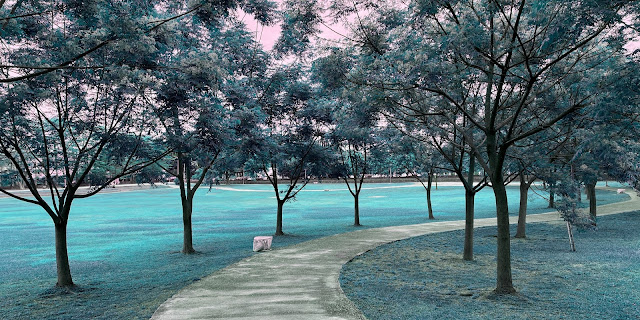The tree I’ve long known as bitter lilac (苦楝)—also called Chinaberry, neem, golden bell, white cedar, or even the flower-heart tree (花心樹)—holds a quiet, enduring place in my memory.
Back in my childhood, in the countryside of Shuichangliu (水長流), several of these trees stood beside our family home. We called them khóo-lîng-á (苦楝仔) in Taiwanese. I remember how, during a certain season—though the exact month escapes me now—these trees would draw in a peculiar visitor: the citrus long-horned beetle (星天牛), a striking insect that seemed especially fond of gnawing at the bitter lilac’s bark, tender shoots, and leafy branches.
Later, I learned that the beetle laid its eggs inside the bark. Once hatched, the larvae would tunnel into the heartwood, slowly hollowing the tree from within. It brought to mind something the village elders used to say, always with a hint of mystery:
“The bitter lilac… how bitter it is. Before the tree dies, its heart dies first.”
(苦楝仔!苦啊!樹身未死,樹心先死。)
That saying—so simple yet haunting—lingered in my thoughts. Over time, I came to realize it wasn’t just about a tree. It was a quiet metaphor for life. Sometimes, even when we appear intact on the outside, something essential within us may already be fading. It’s a feeling many of us know well. In certain moments, we don’t just understand the words—we feel them.
Call it empathy or sympathy—they are both threads of unspoken human sorrow.
(同理也罷,同情也罷,皆是一縷不言而喻的人間惆悵。)
Just today, walking past the Democracy Lawn trail (民主草坪步道) in Wufeng, I saw bitter lilac trees again—this time crowned in a delicate blaze of lilac blossoms. Their soft purple blooms swayed gently in the spring breeze, lighting up the path with unexpected beauty. It stirred something deep within me. For a moment, I was transported back to the days of my youth, and the words of the elders came echoing back.
Though I walk today with faith, accompanied by a sense of divine presence, I still find myself pausing at the sight of these trees. There’s something in their fleeting beauty—in their flowering and quiet strength—that speaks to both the fragility and resilience of life. I felt a quiet sigh rise within me.
A moment shared silently with the trees. Not sorrow exactly, but a soft, wordless recognition.
(與樹靜靜共享的時刻。談不上哀傷,只是一種柔柔的、無言的領悟。)
= = =
相關文章 (See also):
1) 苦楝 (China-berry Tree) (2022)
2) Stories of Geckos (小壁虎) (2024)
3) The Lawn Has Been Mowed! (2022)

























沒有留言:
張貼留言